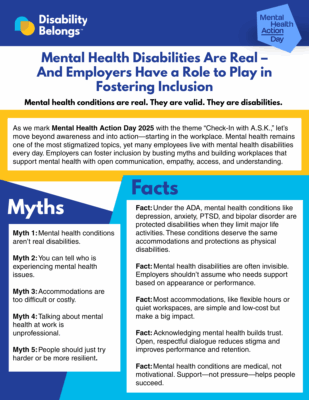Mental health conditions are real. They are valid. They are disabilities.
As we mark Mental Health Action Day 2025 with the theme “Check-In with A.S.K.,” let’s move beyond awareness and into action—starting in the workplace. Mental health remains one of the most stigmatized topics, yet many employees live with mental health disabilities every day. Employers can foster inclusion by busting myths and building workplaces that support mental health with open communication, empathy, access, and understanding.
Myths
- Myth 1: Mental health conditions aren’t real disabilities.
- Myth 2: You can tell who is experiencing mental health issues.
- Myth 3: Accommodations are too difficult or costly.
- Myth 4: Talking about mental health at work is unprofessional.
- Myth 5: People should just try harder or be more resilient.
Facts
- Fact: Under the ADA, mental health conditions like depression, anxiety, PTSD, and bipolar disorder are protected disabilities when they limit major life activities. These conditions deserve the same accommodations and protections as physical disabilities.
- Fact: Mental health disabilities are often invisible. Employers shouldn’t assume who needs support based on appearance or performance.
- Fact: Most accommodations, like flexible hours or quiet workspaces, are simple and low-cost but make a big impact.
- Fact: Acknowledging mental health builds trust. Open, respectful dialogue reduces stigma and improves performance and retention.
- Fact: Mental health conditions are medical, not motivational. Support—not pressure—helps people succeed.
Employers: How to Take Action
You don’t need to be a therapist to support your team. You just need to A.S.K. and lead with inclusion.
Acknowledge
- Recognize mental health conditions as disabilities.
- Include mental health in your diversity, equity, and inclusion strategies.
- Normalize conversations about mental health at work.
Support
- Train managers to recognize signs of mental health issues and respond appropriately.
- Protect confidentiality and invite self-identification.
- Offer reasonable accommodations under the Americans with Disabilities Act.
- Offer Employee Assistance Programs and mental health resources.
- Partner with disability-led organizations like Disability Belongs™ to create truly inclusive, supportive workplaces informed by lived.
Keep in Touch
- Create a psychologically safe environment in which employees feel they can share ideas, raise concerns, or ask for help without fear of being punished, shamed, or judged.
- Check in with staff regularly, including about their wellbeing.
- Celebrate Mental Health Action Day.
Quick actions that make a big impact
- Use inclusive language. Avoid stigmatizing terms like “crazy” or “unstable.”
- Start meetings with an optional well-being check-in. Modeling openness reduces stigma.
- Honor flexible work. It’s not a perk—it’s an inclusion strategy.
- Center lived experience. Make space for employees with mental health disabilities to lead and inform change.
Don’t just raise awareness this Mental Health Action Day—take action. Let’s A.S.K. and lead with care.
Learn more at www.mentalhealthaction.network and www.DisabilityBelongs.org.





